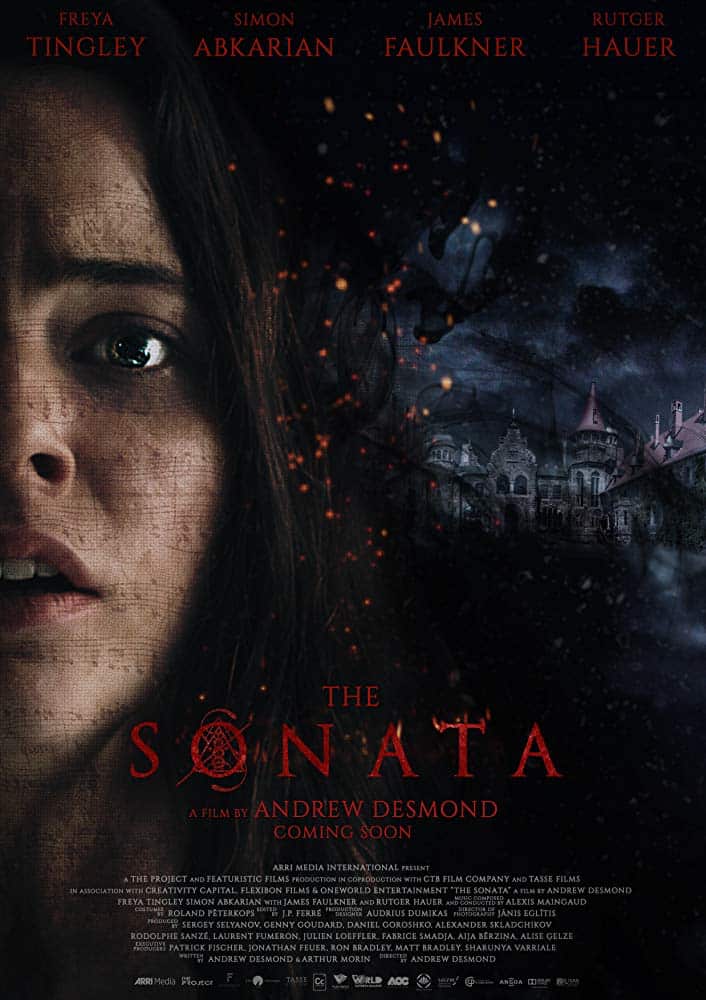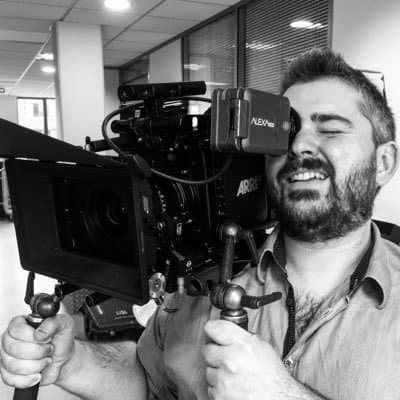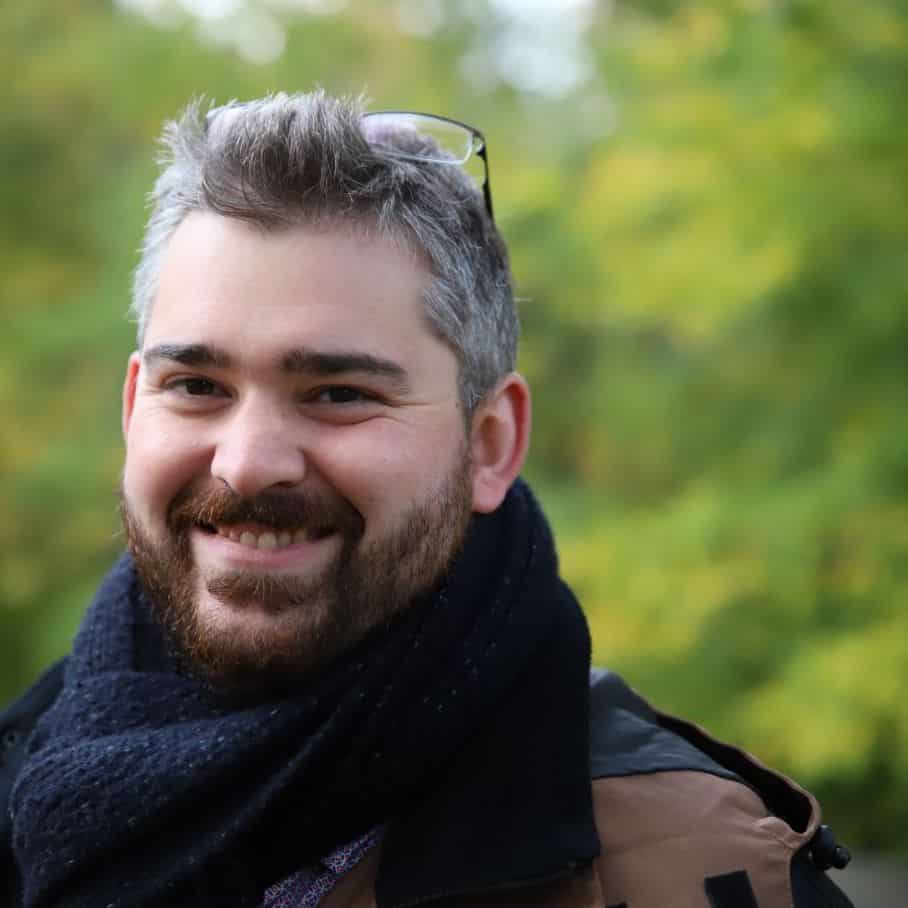
With filming locations in England, France, Russia, and Latvia; a cast including Freya Tingley, Rutger Hauer, and James Faulkner; and music by award winning composer Alexis Maingaud, The Sonata (2019) ain’t your granddad’s indie movie.
As soon as you get a chance to see it, I highly recommend that you do! Not only is the film one of the best examples of modern Gothic horror I’ve seen, but the team behind The Sonata are some of the most generous and genuine folks in the industry. Case in point: when asked about the possibility of getting an interview with someone they had not one, not two, but three willing victims volunteers.
Over the next few days as The Sonata winds up its festival run, The Scariest Things will be posting a series of interviews with a few of the key people responsible for bringing the film to life:
- Andrew Desmond: Co-writer, director, and all around swell fella.
- Laurent Fumeron: Stalwart producer and co-founder/CEO of the production company, The Project.
- Freya Tingley: Consummate actor playing the lead role of Rose Fisher in The Sonata and newly minted violin virtuoso*.
First up, Andrew Desmond, the man with the plan and the vision to put it on screen…

Thanks for taking the time to talk to us, Andrew! Starting off with my standard opening question for directors… what filmmakers do you keep a close eye on and/or have inspired you?
There are so many different filmmakers I love and find inspiring but at the very top of the list I would say Stanley Kubrick, Steven Spielberg, Martin Scorsese and David Fincher. In the case of The Sonata, Roman Polanski and Spanish filmmakers such as J.A. Bayona and Alejandro Amenabar were also big influences.
Your first project, the short film Entity (2014), was co-written with J.P. Ferré and The Sonata was co-written with Arthur Morin. Do you find it helpful to collaborate with someone during the writing phase?
Yes, absolutely. I think it’s important to find the right balance with someone who’s able to bring something to the story that you’re looking for and which you can’t necessarily bring fully yourself.
In the case of Arthur Morin with whom I wrote The Sonata and with whom I am writing several other projects with at the moment, we complete each other quite well. He is more rationally minded than I am and he’s more mindful of what is relevant to the characters and the plot or not. I have a tendency to come up with the more visual and cinematic stuff even if it sometimes goes the other way round. Creatively it can be very rewarding once you find the right match with the right person.

I’m a sucker for a good Lovecraft-y story which means The Sonata is right in my wheelhouse. Are you a fan of H.P. Lovecraft or are the similarities in your film just a happy accident?
Not an accident! Both Arthur and I are big Lovecraft fans and his influence definitely seeped into the script as well as the mood and atmosphere of the film in general. It’s all about what you can see and can’t see and what your imagination will do to fill in the gaps. In the case of music, a lot comes through what you hear and feel and that was what one of the enticing aspects was for me with this project.
The world premiere for The Sonata took place in Russia and you’re gearing up for a September screening at the FilmQuest Film Festival in Utah. Do you look forward to showing your movie off at film fests? And how does the reaction to your film affect you personally?
Yes of course! The reception for The Sonata at screenings has so far been very enthusiastic. I’m very happy the film is slowly finding its audience and will continue to go on being screened in various different countries. As a director it’s a very joyful and exciting experience, especially after all the hard work which was put into making the film.

Now that you’ve completed your first feature-length film, is there anything that you learned during the making of The Sonata that will change how you handle your next project?
Nothing major but probably a lot of little things in terms of the way I work with various different aspects and players of the overall process.
I find working with actors is always a fascinating part of this and it’s something I believe you always keep learning from no matter how many films you’ve made.
I ask this next question from a place of love as I truly did enjoy The Sonata. Is there a story behind the CGI used in the film’s climax? After looking at other reviews, it seems I wasn’t the only one who found it… distracting.
I wanted to end the film with something completely insane and very visual for the climax scene even though I knew we were on a tight budget. To me, it was important to show what we were speaking of since the rest of the film only hints towards snippets of it. But, in complete honesty, I am not 100% satisfied with the CGI in this scene either, even though some of the shots aren’t too bad I thought.
It’s very difficult in this day and age to live up to the audience’s expectations in that respect with all the massive CGI blockbusters people are now inundated with. It’s actually quite hard to obtain a completely satisfying result when you have little time and money. In hindsight though, if I were to do the whole thing over again, I would show less and maybe even do more practical “in camera” live effects.

Do you have any words of wisdom for the budding directors out there who are looking to hit the festival circuit with a film of their own some day?
Yes: never give up. It sounds cheesy and cliché, but it’s true.
If you truly, sincerely love making movies and can’t envision your life otherwise, never let go of that and just go for it. Be demanding also; not just to those you work with but to yourself especially.
Can you share any details about future festival showings or streaming release dates for The Sonata? Our readers would love to get their eyeballs on it.
The movie will be screened at two more festivals in the US soon and will get a theatrical release there by the end of the year or beginning of next year if all goes well, fingers crossed.
[TST Note: You can catch The Sonata in Provo, Utah on September 8th as part of the great FilmQuest Film Festival. The movie will also be having its UK premiere on Sunday, August 25th at Fright Fest in London.]

What comes next in the Story of Andrew Desmond? Can we look forward to another fun genre project in the future?
I am currently working on several new feature projects at the moment including a gritty western and science fiction film which will hopefully be the next one to be made.
Is there anything else you’d like to say to our readers?
If you’ve seen The Sonata and enjoyed it, tell all your friends!
And here’s a bonus question for extra credit… Given that The Sonata was one of the last films for beloved genre legend Rutger Hauer, do you have any stories or anecdotes you’d like to share?
I remember having breakfast with Rutger one morning at the hotel we were staying at and he spent at least an hour telling me on-set tales of working with Ridley Scott and Harrison Ford on Blade Runner (1982) and how he was just amazed by the sets when going to work every day.
As a fan, I felt like a little kid in a toy store just listening to him and had a huge smile from ear to ear whenever he started acting in front of the camera. He was a rock star and a very funny, lovable guy to be with. I’ll miss him very much.
What a great experience! Thanks very much for sharing that with us and for taking time out of your busy schedule to answer our questions.
And that wraps up the first of our interviews with The Sonata team. If you happen to be near Utah or London in the coming days, carve out some time to catch a screening at FilmQuest or Fright Fest. You’ll be glad you did!
*I’m pretty sure three months of lessons are what it takes to be a virtuoso.
Interview by Robert Zilbauer


